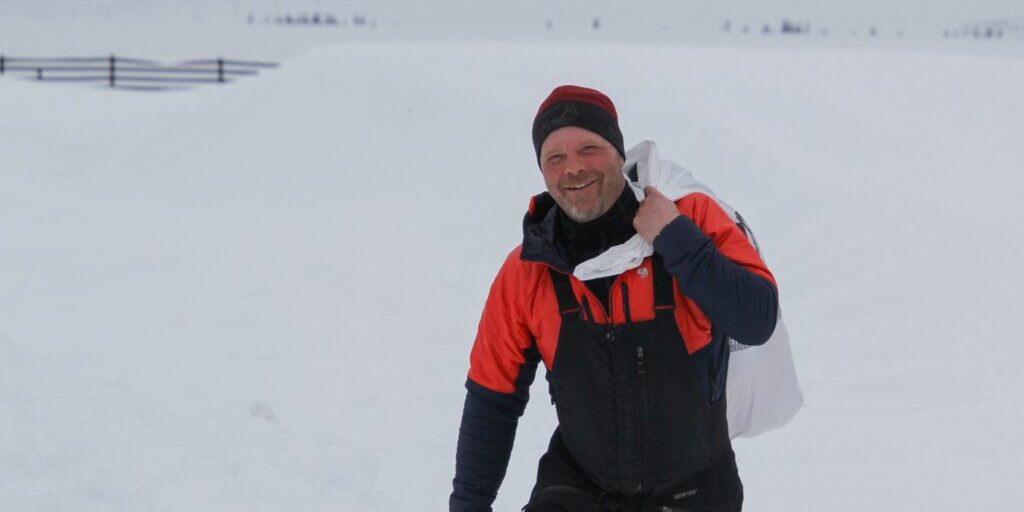Aaron Burmeister finished second in the 2021 Iditarod Trail Sled Dog Race, reaching the finish line in Deshka Landing just 3 hours after Dallas Seavey, the now 5-time Iditarod Champion.
KNOM’s Sophia DeSalvo spoke with Burmeister about his team’s Iditarod performance this year and what it will take to finally bring home the gold.
Aaron Burmeister has been racing the Iditarod for the past 27 years and has finished in the top five 7 times, but he has yet to win. In a year where everything was largely affected by the COVID-19 pandemic, mushing was no exception. However, for Burmeister, this meant dedicating even more time to training for the Last Great Race.
“So it did change up the training. The focus and training with the dogs that we’ve always had was still there solidly, but we certainly spent a lot more time with them and on the trail this winter because there was nothing else to do, and we didn’t go out and do any socializing.”
– Aaron Burmeister
A critical change made to this year’s Iditarod was its shortened route, which Burmeister felt really transformed the race, especially without the usual finish in his hometown of Nome.
“You know it’s a different event when you’re not going to Nome. It felt like a ‘Gold Trail Loop.’ It was certainly a world-class dog sled race, but it wasn’t the Iditarod or it didn’t feel like the Iditarod because you didn’t have the villages, you didn’t have the people and friends along the Yukon River and the Coast and it just being a different trail.”
Despite the changes to the 2021 race route, Burmeister acknowledges that adapting to different conditions on the trail is a major part of mushing.
As far as strategy goes, Burmeister stressed that the best approach “period” is to run your own dog team within their capabilities and how they were trained. The veteran musher had trained his team using two schedules, a passive one and a more aggressive one; the night before the race began, Burmeister opted to take the passive schedule.
“Which was to stack my rest early in the race, stop at Nikolai for an 8 and get behind the lead pack. By taking an 8 early, it puts me immediately 4 hours behind the leaders, and that allowed me to have a trail ahead of me and let the frontrunners go out there, wear their dogs out some, and set the trail.”
While a pack of 7 or 8 competitive teams pushed Seavey in the front, Burmeister hung back in the shadows, keeping his team well-rested and strong before making his move.
“I was four hours behind them, knowing in the back of my mind that my schedule by Nikolai would come back together and even out with Dallas’, which it did. On the way back between McGrath, Nikolai, and Rohn, I launched by a lot of the teams that were up there racing hard and was right back in the hunt with Dallas, and that was part of the plan of that schedule, so it went like clockwork.”
Toward the end, however, Burmeister realized he needed more time and more mileage to be able to overtake Seavey. But with only 150 miles to the finish, Burmeister executed his final big move in his run from Rohn to Skwentna, making up some time on Dallas but ultimately falling short in the end.
By all accounts, this year’s Iditarod performance is one of Burmeister’s best, but his mindset after a second-place finish demonstrates what a fierce and elite competitor he really is.
“So I didn’t win this year’s race, I was second place. Yes, on paper it looks like my best race. I think I’ve run just as good or better races in the past and fell short, but from my mind, I’ve got to take that gamble. I’ve got to take that shot at winning. And whether I’m second, or fifth, or tenth, if I’m not winning it really doesn’t matter to me. My goal was to win, and that’s something I’ve dreamed of.”
Burmeister is back home in Nenana after the 2021 Iditarod, but his sights are set on returning to Nome in 2022.
“Next year is our 50th anniversary. I’m planning on that being my last Iditarod, but my goal is to bring the victory home to Nome next year. We’ll be just as focused, train just as tough of a dog team, and hopefully be able to bring that victory home to Nome.”
Image at top: Aaron Burmeister walking into Unalakleet in the 2020 Iditarod Trail Race.




